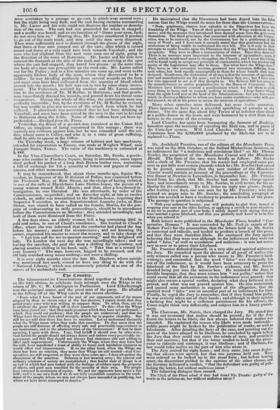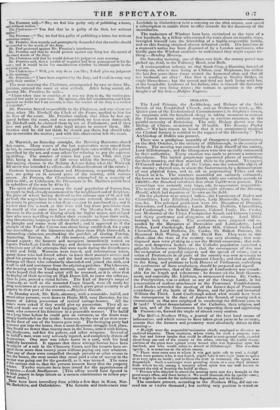" With your notions of honour, you will probably be
glad that, instead of cropping your ears in the olden fashion, or applying a switch to your shoulders, or my toe to another part of your body, I satisfy myself with saying that you have asserted a gross falsehood, and that you perfectly well knew it to be false when you uttered it."
Both letters were published in the Manchester Times, headed "Con- servative Honour." It was contended by Mr. Peel (a cousin of Sir Robert Peel) for the prosecution, that the letters held up Mr. Sowler to contempt and ridicule, and tended to produce a breach of the peace, and that they were therefore libels. He cautioned the Jury against believing that they were true although in the indictment they were not called "false," as well as scandalous and malicious : it was not neces- sary to aver or to prove their falsehood. Mr. Prentice defended himself, in a very able and spirited address to the Jury. He remarked upon the absence of all proof of malice (the only witness called was a person who swore to Mr. Prentice's hand- writing); and contended, that the word " false " was designedly left out of the indictment, as it would have been necessary to prove the falsehood of the libel by Mr. Sowler's evidence, and Mr. Sowler dreaded being put into the witness-box. He reminded the Jury, in forcible language, that, they must return him "not guilty," unless they could swear that all the averments in the indictment were proved : they might also return a special verdict, declaring what they believed to be proved, and what was not proved against him. He also maintained, and quoted some authorities in support of the allegation, that, the omitted word " false" was an essential part of an indictment for libel. Filially, he urged the Jury to remember, that if they found him guilty, be was entirely taken out of their bands; and although in their opinion a farthing fine might be a sufficient punishment for his offence, the Court might think very differently, and subject him to a heavy punish- ment.
The Chairman, Mr. Norris, then charged the Jury. He stated that it was not necessary that malice should be proved ; for if the Jury found the letters to be libels, the law always Inferred that malice was intended. He explained the reason why libels were made indictable : public peace might be broken by the publication of truths, as well as falsehoods. After detailing the facts of the case, and pointing out the parts of the letter alleged to be libellous, be concluded by again telling the Jury that they could not enter the minds of men, and scrutnrze their real motives; but that if the letter tended to hold up the prose- cutor to ridicule and contempt, it was libellous ; and if libellous, the law would infer malice on the part of him who wrote it. The Jury retired for eight hours ; and then came. into court declar- ing that eleven were agreed, but that one juryman held out. They were ordered to be locked up in the usual form ; but before leaving court, the dissentient yielded to the opinion of the other eleven, and the foreman delivered a verdict, "that the defendant was guilty of pub- lishing the letter, but without malicious intent."
The following dialogue then ensued.
The Clerk of the Peace asked if they had found Mr. Prelatic guilty of tie words in the indictultnt, but without malicious intmt ? The Foreman said—" No; we find him guilty only of publishing a letter, and without malice."
The Chairumn—" You flail that he is guilty of the libel, but without malice?"
The Foreman—" No; we find him guilty of publishing a letter, but without malicious intent."
Mr. Prentice then warmly and peremptorily demanded that the verdict should be recorded in the words of the Jury. Mr. Peel protested against Mr. Prentice's interference. Mr. Prentice said that he would protest against any thing but the record of the exact words of the Jury.
The Chairman said that he would deliver his jud,gment next morning.
Mr. Prentice said, that a verdict of acquittal had been pronounced in his fa- sour; and it would be for his consideration whether he should appear in the morning or not.
The Chairman—" Well, you may do as you like; I shall give any judgment in the morning." Mr. Prentice—." I have been acquitted by the Jury, and I snail in every way justify their verdict."
The next morning the Chairman, accompanied by two or three Ma- gistrates, entered the court lit nine o'clock. After being seated, ad- dressing Mr. Prentice, be said—
.4I have taken time to consider, as it was my duty to do, the verdict pro- nounced last night in your case. My opinion, after full consideration, and I now entertain no doubt but I am correct, is that the verdict of the Jury is a verdict of acquittal."
Mr. Prentice bowed respectfully to the Chairman, and was ahout re- tiring, when Mr. Birchall, the Clerk of the Peace, applied to him for the fees of the court. Mr. Prentice replied, that when he last ap- peared before the court, and was acquitted, no fees were demanded. Mr. Birchall said, he claimed them by act of Parliament ; and if they were not paid, he should take legal means to recover them. Mr. Prentice said he did not think he should pay them, but should take time to consider the matter; and with this observation left the court.



















 Previous page
Previous page